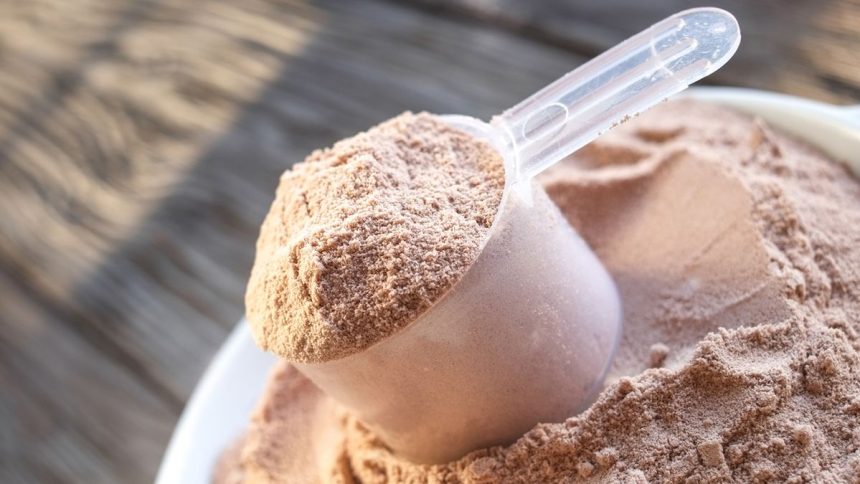Protein powder has been discussed as a dietary supplement for muscle growth. Playing sports and losing weight?
Face it: If you want to build muscle. Enhance recovery, lose weight or just want to cook a quick and healthy meal. There’s nothing better than a protein shake. Protein shakes play an important role in building muscle mass and increasing strength and promoting physical recovery. However, protein powders vary in content, quality, and strength, ranging from nutritious to hazardous. Here’s what the science says about protein powder.
What does protein do?
Protein is an essential nutrient with 20 amino acids, 9 of which the body cannot produce and must be obtained from food. Amino acids are the key building blocks of the body and are found in muscles, tendons, bones, skin, hormones, tissues, enzymes, red blood cells, and so on.
Dietary protein provides the body with the amino acids needed to build and repair muscle. Heals wounds and injuries and produces hormones and enzymes that store and transport oxygen throughout the body Good sources of protein include eggs, dairy products. Fish and poultry, fish, beans, lentils, soybeans, tofu, solid foods (such as protein powder) or protein supplements.
What is a protein powder?
Protein powder is a protein powder derived from milk. (casein or whey), egg white powder or plant extracts (soybeans, peas, rice, pumpkin, hemp) contain other ingredients such as spices and flavors. Vitamin and mineral density The amount of protein varies depending on the type used. For example, whey protein contains 25 grams of protein per serving. Pea protein, on the other hand, has 15 grams of protein per serving.
How much protein powder should I eat daily?
The amount of protein required daily varies with age and can be greatly increased by exercise, injury and/or illness, helping to fill gaps in the diet.
The Dietary Reference Intakes (DRIs) for protein for adults are:
- For men and women: 0.8 grams of protein per kilogram of body weight per day.
- 65 years and older: 1-1.2 grams of protein / kg of body weight / day.
The protein recommendation for active athletes, both male and female, is between 1.2 and 2.0 g/kg/day. It depends on your needs and training goals. These amounts vary based on program level, age and other needs. So talking to your dietician or health care provider about what is best for you.
Benefits of protein powder
Protein (and protein powder) offers many health benefits, including improved exercise, reduced damage and faster tissue repair.
Weight management
Evidence suggests that a high-protein diet (comprising 25-30% of daily calories from food and supplements) can increase metabolism and help with weight loss. You will get more from that benefit. If you’re looking for a workout supplement, you might like this protein shake.
How long does protein powder work?
Studies show that protein intake (in any form) within two hours of exercise, especially when used in conjunction with carbohydrates. Increase body mass and accelerate recovery Consumption of protein shakes on an empty stomach before or immediately after exercise has been shown to help increase muscle protein synthesis. That’s very important for playing sports.
Although protein timing can be beneficial for athletes, the researchers believe it is critical that non-athletes focus on high-quality protein intake every day.
What is the shelf life of protein powder?
Under normal storage conditions, whey protein powder will keep for 9-18 months, but depending on the additives used by the manufacturer, the shelf life can be extended up to 2 years. Dairy-free and can be used for up to 2 years. This chart is a general rule of thumb but not a substitute for the appearance or smell of your protein powder, if so it could be incorrect regardless of the date on the package.
What do you do with protein powder?
Most protein powder can be mixed with water and milk or other plant-based milks. And drink it as a quick pre- or post-workout drink. Mix protein powder with vegetables, tomatoes, avocados and chia seeds to add omega-3 fatty acids, fiber, vitamins and minerals.
Risks of protein powder
There are even benefits, but there are risks associated with protein powder. In addition, unlike food, planning is largely in the hands of producers. The FDA must approve a product if it contains new ingredients. In addition, the FDA is responsible for removing counterfeit or defamatory dietary supplements. Since protein powders are considered a dietary supplement, they are therefore not processed. So it’s important to choose brands that have been tested by others to make sure you’re getting what you’re getting on the label.
It can cause digestive problems. Too much protein can lead to digestive problems including vomiting, diarrhea, diarrhea, vomiting and diarrhea. Sugar can be added while some protein powders can be less. Some can contain up to 23 g/scoop of sugar (the daily recommended amount of added sugar). Studies have shown that excessive consumption of pure alcohol can lead to health problems such as heart disease, cancer, obesity and increase the risk of heart disease. Risk of type 2 diabetes
Potential Contaminants Egg white powder is notorious for BPA, lead and other heavy metals such as arsenic, cadmium and mercury. One study found high levels of arsenic, cadmium, mercury and lead in 40% of protein powders tested. He is gone while another reported lead and cadmium content in 70% and 74% of compounds tested, respectively. However, science may say that protein powders contain heavy metals, but research shows that the levels in these products do not cause other health problems. One way to avoid this is to lower your risk by choosing a third-party tested protein powder.
Watch out for artificial sweeteners Manufacturers often use artificial sweeteners instead of sugar cane. It may seem like a good choice. But science says otherwise. New research suggests that artificial sweeteners (such as aspartame, acesulfame-K and sucralose) are associated with an increased risk of cancer. So always check the label before buying protein powder.

Personal protein powder
Interchangeable protein powders are special protein blends designed to support your health and fitness. And to meet your nutritional needs, think of it as a supplement and protein powder in a scoop made just for you. So you need a protein powder that works for you. Not Against Your Customizable protein powders identify the right proteins, ingredients (peanuts and whey), and functional supplements (like probiotics and ashwagandha), all tailored to your body’s needs to help you get results.
Explain briefly
Fitness experts and fitness enthusiasts have long recommended a protein powder – and for good reason. Studies have shown that protein plays an important role in maintaining lean muscle mass. Weight loss (or weight loss) improves energy and stores muscle, and if you can get the most of this amazing nutrient from food sources. Protein powder fast and easy intake. Despite the risks of protein powder (for example, added sugars, digestive problems and possible side effects), the benefits are greater if you choose other tested products that you can use.











